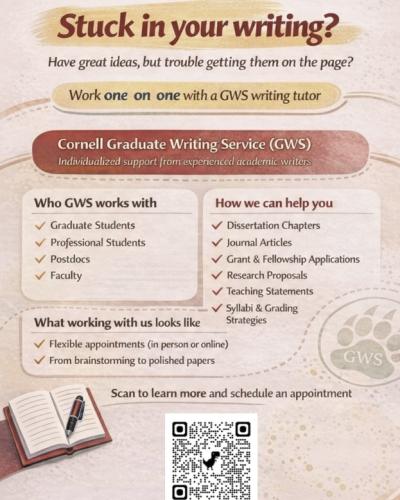Cornell Writes! Tips from our community of writers is a digital newsletter sponsored by the Knight Institute for Writing in the Disciplines and the Cornell University Graduate School.
Each week, a member of our writing community – a Graduate Writing Service, English Language Support Office, or Cornell Writing Centers tutor; a writing specialist from the Knight Institute; a writing instructor from our First-Year Writing Seminars or Writing in the Majors programs; maybe YOU – will share a writing strategy from their own writer’s toolkit. #writelikeabear
Contact Tracy Hamler Carrick with questions and ideas.
Meet Raunak Sen
Hello Cornell Writers! My name is Raunak Sen. I am a PhD candidate in the Department of Neurobiology and Behavior and also a writing tutor at the Knight’s Institute’s Graduate Writing Service. Currently I am writing some grant proposals and beginning to write a manuscript for a scientific journal. As a tutor, I enjoy working with students on the logic and flow of their writing.
Here is this week’s Writing Tip!
Here, I have some general tips for writing, spanning the entire journey. A key point in this journey is making steady progress.
- Getting started: For me, writing is very difficult unless it is clear in my brain what I am about to write, but that often leads to procrastination. To avoid that, I try to write my ideas on paper and try to form an outline. Often in the STEM fields (to which I belong!), writing proposals or papers follows the canonical structure of Big picture question -> Specific question -> Hypothesis/Predictions -> Methods -> Results (or expected outcomes) -> Discussion/Conclusion. My outline mirrors this structure.
- First draft: Once I have an outline on hand, I try to expand each point on my outline to write my first draft. The goal of the first draft is completion, not perfection. I follow the hourglass model to structure my writing. In brief, the model urges you to begin your writing with the general topic, then you converge into your specific work and you finally end your essay by explaining what you found in light of the general topics again!
- Daily writing: I have realized that writing a little every day turns out to be more productive in the long run than waiting for motivation to start writing. Even if it is only for 30 minutes a day, treating it as a daily chore instead of an inspiration-dependent special task, helps!
- Revise! Revise! Revise! Revisions are an integral part of any kind of writing. When revising, I focus on:
- Global issues : Does my essay contain all the necessary parts and do all the parts make sense together?
- Local issues: Are all grammar and spelling correct? Are there a variety of sentence structures? Are there words I am repeating a lot which makes the writing monotonous?
- Modularity: Does each paragraph have a purpose? Is the purpose made clear using a thesis/topic sentence? Does each paragraph have a slightly different focus?
- Flow: Are the different parts of the essay in a logical sequence? Do the paragraphs transition smoothly? Are there transition sentences?
- Audience: Whom am I writing for? Did I give enough background information for them to understand? Have I missed any logical steps they might need to understand my writing?
My writing often goes through many rounds of revision. I often send my writing to peers and my advisor(s) for their feedback and then improve my draft based on their suggestions. This is intertwined with the revision process. At the end of the day, writing is a journey, not a destination. It is important that we enjoy the journey. To that end, coming back to a piece of writing after a day or a few days often helps because we have fresh ideas on how to make our writing more engaging!






